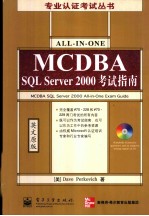图书介绍
MCDBA SQL Server 2000考试指南 英文原版2025|PDF|Epub|mobi|kindle电子书版本百度云盘下载

- (美)Dave Perkovich著 著
- 出版社: 北京:电子工业出版社
- ISBN:7505375296
- 出版时间:2002
- 标注页数:417页
- 文件大小:63MB
- 文件页数:431页
- 主题词:
PDF下载
下载说明
MCDBA SQL Server 2000考试指南 英文原版PDF格式电子书版下载
下载的文件为RAR压缩包。需要使用解压软件进行解压得到PDF格式图书。建议使用BT下载工具Free Download Manager进行下载,简称FDM(免费,没有广告,支持多平台)。本站资源全部打包为BT种子。所以需要使用专业的BT下载软件进行下载。如BitComet qBittorrent uTorrent等BT下载工具。迅雷目前由于本站不是热门资源。不推荐使用!后期资源热门了。安装了迅雷也可以迅雷进行下载!
(文件页数 要大于 标注页数,上中下等多册电子书除外)
注意:本站所有压缩包均有解压码: 点击下载压缩包解压工具
图书目录
Introduction1
Chapter 1 Introducing Microsoft SQL Server 20003
Northwind Distributors Case Study3
Microsoft SQL Server 2000 Overview4
Implementation Architectures4
How Clients Communicate with SQL Server6
SQL Server Services8
Default Databases9
What a Database Includes10
New Features in SQL Server 200012
Planning a SQL Server 2000 Installation15
What Is the Primary Function of This Server?15
What Are the Performance and Redundancy Expectations?16
How Will SQL Server Be Licensed?17
Will Replication Be Required?17
Chapter Review18
Questions18
Answers19
Chapter 2 Installing SQL Server 200021
Installing SQL Server 200021
Performing a Local Installation21
Performing a Remote Installation25
Installing the Client Utilities27
Unattended Installation28
Upgrading to SQL Server 200031
Upgrade Requirements31
Upgrading SQL Server 7.0 to SQL Server 200031
Upgrading SQL Server 6.5 to SQL Server 200031
Connectivity Problems35
Uninstalling SQL Server 200035
Failed Installations and General Troubleshooting35
Troubleshooting SQL Server Installations35
Chapter Review36
Questions36
Answers38
Chapter 3 Configuring Microsoft SQL Server 200039
Verifying Your SQL Server 2000 Installation39
Windows 2000 Service Control Manager39
SQL Server Service Manager40
SQL Server Administration Tools42
SQL Server Enterprise Manager42
Client Network Utility45
Configure SQL XML Support in IIS46
Import and Export Data46
SQL Profiler47
Server Network Utility48
SQL Query Analyzer48
Common Configuration Tasks50
SQL Server Startup50
Connection Management52
Configuring Mail Support56
Configuring Network Libraries57
Introducing the Structured Query Language58
Transact-SQL Commands58
Using the SQL Query Designer64
Chapter Review66
Questions67
Answers69
Chapter 4 Creating SQL Server 2000 Databases70
What Is a SQL Server Database?70
Where the Data Is Stored71
Creating a Database72
Modifying a Database76
Available Database Options76
Setting Database Options80
Changing the Size of a Database82
Attaching and Detaching a Database84
Chapter Review86
Questions86
Answers88
Chapter 5 Creating and Managing Database Objects89
Introducing Tables89
Primary and Foreign Keys90
Creating a Table93
Modifying Tables98
Deleting Tables101
Introducing the Database Designer101
Introducing Constraints106
Introducing Indexes109
Creating an Index111
Deleting an Index112
Introducing Stored Procedures113
Executing Stored Procedures115
Creating Stored Procedures116
Modifying a Stored Procedure118
Deleting a Stored Procedure118
Introducing Triggers119
Creating a New Trigger120
Reviewing and Editing an Existing Trigger123
Introducing Views125
Examining Existing Views126
Accessing the Data in a View126
Creating Views127
Modifying Views130
Deleting Views132
Chapter Review132
Questions132
Answers134
Chapter 6 Managing and Monitoring SQL Server 2000 Security136
Configuring the SQL Server Security Mode136
Windows Authentication Mode136
Mixed Mode138
Creating and Managing Logins139
Delegation and Impersonation143
Creating and Managing User Accounts143
Creating and Managing Security Roles145
Server Roles146
Database Roles147
Creating Database Roles149
Setting permissions in a database150
Enforce and manage security154
Manage Security Auditing154
Auditing Security with the SQL Profiler(SP)155
Chapter Reivew159
Questions160
Answers162
Chapter 7 Managing,Monitoring,and Troubleshooting SQL Server 2000 Databases163
Optimizing Database Performance163
Indexes164
The Index Tuning Wizard164
Customize Locking165
Recompiling170
Optimizing Hardware Use170
Managing Server Memory171
Managing Server Processors173
Managing Hard Drives174
Optimizing Files and Filegroups174
Performing Disaster Recovery Operations176
Performing Backups176
Recovering and Restoring Data182
Configuring,Maintaining,and Troubleshooting Log Shipping185
Performing Integrity Checks187
Using SQL Server Agent190
Creating and Managing Jobs190
Configuring Operators and Alerts193
Chapter Review195
Questions195
Answers197
Chapter 8 Extracting and Transforming Data with SQL Server 2000198
Supporting the Extensible Markup Language(XML)198
XML Overview199
Setting up IIS201
Importing and Exporting Data205
Using the Bulk Copy Program(BCP)206
Using Data Transformation Services(DTS)210
Developing and Managing DTS Packages211
Introducing DTS211
Transforming Data with DTS216
Managing Linked Servers218
Creating a Linked Server218
Executing Heterogeneous Queries220
Managing Replication Services220
Replication Service Architecture220
Implementing Replication222
Chapter Review240
Questions241
Answers242
Chapter 9 Developing a Logical Data Model243
Defining Entities244
Determining the Primary Entities244
Defining the Attributes of Your Entities244
Selecting a Level of Normalization245
Primary Key246
Designing Entity Keys246
Foreign Key247
UNIQUE Constraints248
Designing Attribute Domain Integrity249
CHECK Constraints250
Data Types250
Creating a User-Defined Data Type with the Enterprise Manager252
Selecting Attribute Properties253
Designing Logical Data Models from Business Scenarios255
Exercise#1:Southwest Bookstore255
Exercise#1:Southwest Bookstore Suggested Solution256
Chapter Review257
Questions258
Answers260
Chapter 10 Implementing the Physical Database261
Creating a New Database261
Database Properties263
Creating the Southwest Bookstore Database264
Creating Database Objects268
Creating Tables268
Creating Indexes276
Creating Views278
Creating Stored Procedures281
Creating User-Defined Functions285
Chapter Review288
Questions288
Answers289
Chapter 11 Retrieving and Modifying Data291
Performing Bulk Data Operations291
Using the Bulk Copy Program(BCP)292
Using the Bulk Insert T-SQL Command294
Using Data Transformation Services(DTS)296
Managing Data Using Transact-SQL304
Transact-SQL Commands305
Using Cursors with Transact-SQL310
Navigating a Cursor312
Accessing Data in a Heterogeneous Environment313
Creating a Linked Server313
Executing Queries to Linked Servers315
Accessing Data Using Heterogeneous Queries315
Retuming Data Using XML317
Extensible Markup Language(XML)Overview317
Accessing XML Data with a URL319
Chapter Review321
Questions322
Answers324
Chapter 12 Programming Business Logic325
Designing Stored Procedures325
Creating Stored Procedures326
Using Input Parameters329
Using Output Parameters330
Modifying a Stored Procedure Using T-SQL331
Deleting a Stored Procedure332
Creating Triggers333
Creating a New Trigger333
Reviewing and Editing an Existing Trigger337
Developing User-Defined Functions339
Creating Views340
Implementing Views341
Accessing the Data in a View343
Modifying Views344
Deleting Views346
Chapter Review346
Questions347
Answers349
Windows Authentication Mode350
How SQL Server Manages Database Access350
Chapter 13 Designing a Database Security Plan350
Mixed Mode351
SQL Server Logins351
SQL Server Roles354
Controlling Table Access355
Restricting Access at the Table Level355
Restricting Access at the Column Level356
Controlling Access Using Other Database Objects358
Using Stored Procedures358
Using Triggers359
Using User-Defined Functions360
Controlling Access Using Views361
Using Application Roles362
Chapter Review363
Questions364
Answers365
Chapter 14 Tuning and Optimizing Data Access367
Optimizing Database Performance367
Indexes368
Customize Locking371
Analyzing Query Execution Plans375
Interactively Executing a Stored Procedure377
Using the SQL Profiler to Analyze Performance380
Chapter Review383
Questions384
Answers386
Appendix A Microsoft Certification Exam Prep 70-228387
Questions387
Answers398
Appendix B Microsoft Certification Exam Prep 70-229402
Questions402
Answers414
热门推荐
- 93493.html
- 3673984.html
- 489459.html
- 2727464.html
- 2122730.html
- 2928261.html
- 2899530.html
- 2484980.html
- 2250063.html
- 1233639.html
- http://www.ickdjs.cc/book_69794.html
- http://www.ickdjs.cc/book_997654.html
- http://www.ickdjs.cc/book_2493196.html
- http://www.ickdjs.cc/book_2676207.html
- http://www.ickdjs.cc/book_3044854.html
- http://www.ickdjs.cc/book_473797.html
- http://www.ickdjs.cc/book_684594.html
- http://www.ickdjs.cc/book_3763800.html
- http://www.ickdjs.cc/book_3235043.html
- http://www.ickdjs.cc/book_71004.html